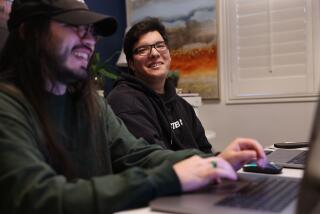Countywide : Disabilities Aren’t Reel on This Trip
- Share via
The fish weren’t biting the way they had hoped, but that didn’t seem to bother 20-year-old Chad Bowser and his fishing partners aboard the Reel Fun on Tuesday morning.
For Bowser, it was good just to get a break from his studies at Coastline Community College. And it was also good just to be out deep-sea fishing in the first place, considering that only four years ago Bowser, who was a Capistrano Valley High School student at the time, nearly died in an auto accident that left him with a serious head injury.
“It’s cool,” he said about the fishing excursion, waiting patiently in his wheelchair for at least one nibble on the line.
Bowser was one of about 25 disabled adults who threw their lines into the waters off the coast of San Clemente during a daylong fishing trip organized by the Wheelchair Sports, Outdoors and Recreation Program, a community service of the nonprofit Casa Colina Centers for Rehabilitation in Pomona.
Although the fish weren’t cooperating, it was a good day to be outdoors.
Darryl Lair, who was paralyzed from the chest down in an auto accident about a year ago, brought along his two children, who managed to catch a couple of fish.
“I don’t think of this as therapy,” Lair said. “This is a blast.”
In the back of the boat, a group of men casually discussed the accidents that had left them disabled.
Bob Bills, an expert fisherman who had the catch of the day with his eight-pound halibut, was knocked off the top of a diesel truck by strong Santa Ana winds about 10 years ago and broke his neck. Mike Lobrano recently underwent neck surgery to correct paralysis caused by complications from a baseball injury he left unchecked 14 years ago.
The fishing trip was one of many organized this year by recreation therapist Anne Johnson, who founded the outdoor program about eight years ago to help people with various disabilities build self-confidence and independence.
Sailing, snow skiing, boating, hiking, white-water rafting, camping and even dog-sledding in Minnesota are among the 40 high-adventure, but safely supervised, recreation activities offered each year. About 1,000 people throughout Southern California have participated in the fee-based program.
“A person has a right to risk regardless of their abilities,” Johnson said. “When provided with an opportunity to choose, they become so much more confident. Their self-esteem is enhanced. Their overall sense of independence just blossoms.”
Not only do the outdoor activities provide an important challenge to the disabled, they offer a chance to fine-tune the skills developed in rehabilitation.
More to Read
Sign up for Essential California
The most important California stories and recommendations in your inbox every morning.
You may occasionally receive promotional content from the Los Angeles Times.













